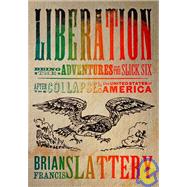
Note: Supplemental materials are not guaranteed with Rental or Used book purchases.
Purchase Benefits
Looking to rent a book? Rent Liberation Being the Adventures of the Slick Six After the Collapse of the United States of America [ISBN: 9780765320469] for the semester, quarter, and short term or search our site for other textbooks by Slattery, Brian Francis. Renting a textbook can save you up to 90% from the cost of buying.
Brian Francis Slattery edits public-policy publications dealing mostly with economics and economic issues; he is also an editor of the New Haven Review, a literary journal. When not editing, he plays the fiddle and banjo. He also writes occasional nonfiction pieces about public policy and the arts, mostly for his local alternative weekly. He is the author of one previous novel, Spaceman Blues, and lives just outside of New Haven, Connecticut with his family.
The New copy of this book will include any supplemental materials advertised. Please check the title of the book to determine if it should include any access cards, study guides, lab manuals, CDs, etc.
The Used, Rental and eBook copies of this book are not guaranteed to include any supplemental materials. Typically, only the book itself is included. This is true even if the title states it includes any access cards, study guides, lab manuals, CDs, etc.
Excerpted from Liberation: Being the Adventures of the Slick Six after the Collapse of the United States of America by Brian Francis Slattery
All rights reserved by the original copyright owners. Excerpts are provided for display purposes only and may not be reproduced, reprinted or distributed without the written permission of the publisher.